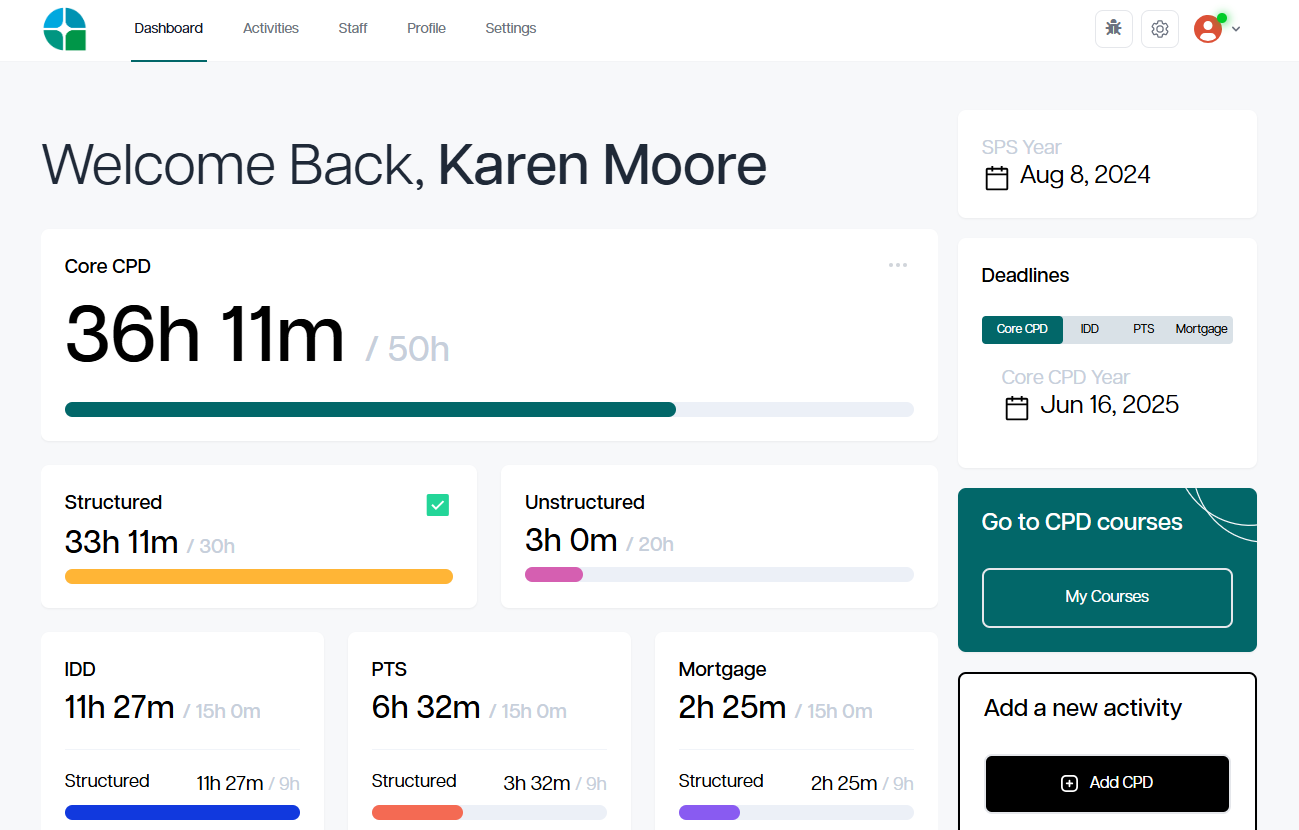Whether you're just starting out in financial advice or are years into your advisory career, understanding and embracing CPD is vital. It’s about staying relevant, sharpening your expertise, and ultimately delivering the best possible service to your clients.
What Is CPD?
Continuing Professional Development centres around the ongoing learning activities that professionals undertake to maintain and improve their knowledge, skills, and competence. For financial advisers in the UK market, CPD isn’t just a nice-to-have, it’s a requirement enforced by both the Financial Conduct Authority (FCA) and professional bodies such as the Chartered Insurance Institute (CII), the Chartered Institute for Securities& Investment (CISI), and the London Institute of Banking & Finance(LIBF).
CPD can take a variety of forms, both structured and unstructured:
Structured CPD
This includes formal learning activities such as:
- Digital training courses (online / e-learning)
- In person training (live classroom training events)
- Professional seminars or industry conferences
- Virtual webinars and workshops
- Studying for further qualifications
Structured CPD must involve clear learning objectives and outcomes, making it easier to record and evidence for regulatory purposes.
Unstructured CPD
This is more informal learning, such as:
- Reading trade publications, regulatory updates, or technical journals
- Attending internal meetings that expand your understanding & knowledge
- Engaging in peer-to-peer learning or reflective practice
While unstructured CPD is valuable, only a portion of your required hours can typically come from this category.
How much CPD do advisers need to complete?
The FCA requires all retail investment advisers to complete a minimum of 35 hours of CPD per year. At least 21 of those hours must be structured, and the learning must be relevant to your current role. If you area Pension Transfer Specialist (PTS) you can add another 15 hours taking your annual requirement to 50 hours in total where 5 of those 15 hours must come from an external provider. It’s also worth noting that 15 hours must come from learning derived from insurance mediation for those involved in any part of the sales process of relevant insurance products.
In addition, advisers must:
- Keep accurate records of all CPD completed
- Reflect on what was learned and how it applies to their work
- Link CPD activity to personal development goals
- Ensure CPD contributes to maintaining fit and proper status
- Be able to evidence your CPD on request
This is all part of maintaining a valid Statement of Professional Standing (SPS), which is a requirement for any adviser providing regulated advice.
Why does it all matter?
Regulatory Compliance
Meeting CPD requirements is non-negotiable if you want to continue practising. Falling short could mean losing your SPS and ultimately your authorisation to advise.
Professional Credibility
CPD = Knowledge and clients can have assurance your knowledge is current. Completing your CPD shows commitment to high standards and reinforces your professional standing.
Career Progression
CPD can open doors to new specialist knowledge and potentially lead to career development. It’s a way to professionally develop and progress your knowledge and potentially even your career to a leadership role.
Confidence and Competence
Regulation, tax, personal allowances, and products change regularly. CPD keeps your knowledge fresh, ensuring you give advice that’s accurate and up to date.
Ethical Responsibility
Advisers handle some of the most important financial decisions in people’s lives and will often work with their clients from their first step on the career ladder to a happy retirement. Keeping your CPD current helps protect your clients and the company you work for from potential future issues.
Tips for managing your CPD effectively
- Set a personal development plan at the start of each year
- Use a CPD log
- Mix structured and unstructured learning for a balanced approach
- Reflect on each activity - don’t just tick boxes
- Schedule CPD activities throughout the year to avoid a last-minute scramble
- Use software such as the Redmill Advance Hub to help you record and report on your CPD seamlessly
Some firms offer dedicated CPD portals with access to great content which can make tracking and planning easier. If yours doesn’t why not mention Redmill Advance!
In summary
Continuing Professional Development is your passport to keeping relevant, respected amongst or peers, and ahead of any chance in the profession. By making CPD a consistent and intentional part of your year you’re reinforcing your value to clients, employers, and ultimately yourself.
In a profession where change is constant, learning must be too.
Check out Redmill Advance Hub to learn how we can support you and your companies CPD needs.






%20(1).png)






